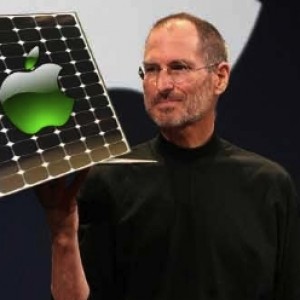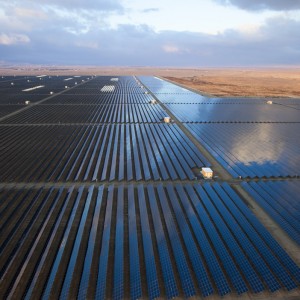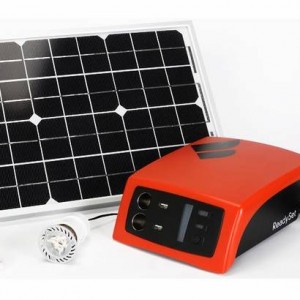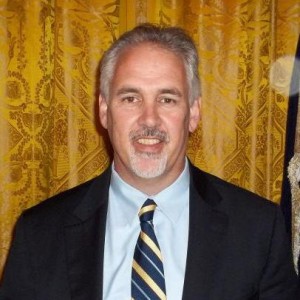
Rick Gardner, Guest Columnist
“Insanely Great!”
– Steve Jobs referring to the new developed Macintosh computer in 1984
“When you grow up you tend to get told the world is the way it is and to just live your life inside this world. Try not to bash into the walls too much. Try to have a nice family, have fun, save a little money. That’s a very limited life. Life can be much broader once you discover one simple fact: Everything around you that you call life was made up by people that were no smarter than you and you can change it, you can influence it, you can build your own things that other people can use.
Once you learn that, you’ll never be the same again.”
– Steve Jobs
 I am a big fan of the late Steve Jobs. He had a transformative view of the world and felt that, if we only believed strongly enough, if we had enough passion, if we worked hard enough, we could change the world for the better. He lived this belief system using it to build the highest valued company in the world, Apple. He did it by envisioning the future and the consumer experience in that future … and then working backwards to make that future happen. He did it by designing and building one product after another that was “insanely great,” that was designed and engineered to perfection.
I am a big fan of the late Steve Jobs. He had a transformative view of the world and felt that, if we only believed strongly enough, if we had enough passion, if we worked hard enough, we could change the world for the better. He lived this belief system using it to build the highest valued company in the world, Apple. He did it by envisioning the future and the consumer experience in that future … and then working backwards to make that future happen. He did it by designing and building one product after another that was “insanely great,” that was designed and engineered to perfection.
Jobs was not a proponent of complex processes and focus groups to develop products. He felt that “people don’t know what they want until you show it to them.” This philosophy led to the revolutionary Macintosh computer, to iPod, to Apple TV, to the iPhone, products that provided people new capabilities that they didn’t even know they wanted or needed. The world has been changed immeasurably for the better … in the vision of Steve Jobs.
The Doom and Gloom of Climate Change
So what does Steve Jobs have to do with climate change? I bring him up to counter the “sky is falling” attitude that climate change activists, myself included, invariably display. They accurately point to the inexorable rise in carbon dioxide and other greenhouse gases in our atmosphere. The rise in carbon dioxide, as shown in the chart below, is certainly alarming. We have shot past 400 parts per million (ppm) carbon dioxide in the atmosphere. That’s an increase of 120 ppm since the beginning of the industrial revolution 200 years ago. It’s 100 ppm greater than the highest level ever experienced in the atmosphere over the past 650,000 years. The greenhouse effect from carbon dioxide and other gases has led to a string of warm years. The hottest year was 2015, and 14 of the 15 years since 2000 have been the warmest in recorded history. The increased energy in the atmosphere is leading to storms of greater magnitude, retreat of the earth’s glaciers, acidification of the oceans, droughts in some parts of the world, flooding in other parts of the world, and the slow but steady rise in sea levels that threaten to submerge whole island nations. Scary indeed!
As an environmental engineer with the Navy, I was one of the point persons on climate change. I was especially concerned about sea level rise at coastal Navy installations world-wide, which would pose a major disruption to our port operations. I and my colleagues developed a quietly apocalyptic view of our future, not just for the Navy but for all of humankind. It was hard to see how humanity could escape destruction from anthroprogenic (human-caused) climate change, particularly in view of the denial movement being led by the petroleum industry.
After all, modern civilization, as we know it, was created through the use of fossil fuels. The combustion of these fuels has created the energy needed to operate electrical plants; to power homes; and to run transportation systems across the seas, over the roads, in the air, and even into space. The leap in technology from the nineteenth century to today has been breath-taking, and it has been based on coal, natural gas, and petroleum oil.
Combustion of these fuels resulted in air pollution problems, which were handled by various pollution control technologies with the aim of stoichiometrically combusting the fuels (complete combustion leading to carbon dioxide as opposed to carbon monoxide). But climate change has shown that this perfect combustion process is itself a problem since carbon dioxide is driving the greenhouse effect that is changing our climate.
So now we have huge fossil fuel industries under varying degrees of governmental regulation that extract the fossil fuels (companies such as Exxon Mobil, Shell, Chevron, and BP) and the electrical utilities that burn the fuels to generate and transport electrical power to the consumer (companies such as Edison, Sempra, Dynergy, and NRG). We have created a “powerful” industry that constitutes a big climate changing monster, or should we say dinosaur since its continued operations will lead to our collective extinction.
The Computer World of Steve Jobs
Steve Jobs grew up in a dinosaur world of mainframe computers produced by a few behemoth companies, most notably IBM. These massive computers were first developed after World War II. The mainframes were owned and operated by large institutions such as Federal and state agencies, universities, and Fortune 500 companies, and the computers were based in special climate-controlled buildings built around their exacting requirements. People depended on computer specialists to access these machines. The user would use a keypunch machine to punch cards containing computer code and job control language (to tell the computer how to run the code). The user handed these cards (typically hundreds or thousands of cards) to the computer specialist, who would run the program through the computer. After a day or so, the user would get a print-out back with the results; if there were any errors at all in the punch cards, the program would fail, and the user would have to correct the mistake and rerun the deck of cards. The users had to be highly proficient in coding languages such as Fortran, COBOL, Algol, and others. But even they didn’t understand the complex hardware involved. The whole mainframe computer technology was cloaked in technological complexity that the ordinary person couldn’t hope to understand.
Enter Steve Jobs with his personal computers. For the first time people could take control of computing at their homes and offices. They could personally write and produce reports, do complicated calculations, create drawings … and effectively by-pass the need for cards, programming languages, secretaries, bookkeepers, illustrators, and of course computer operators. This democratization of computing was immeasurably enhanced by the introduction of people-friendly software and social media. To get an idea of how miraculous this seemed at the time, check out this video with Steve Jobs introducing the game-changing Macintosh computer in 1984 … https://www.youtube.com/watch?v=2B-XwPjn9YY
Steve Jobs and Energy Technology
So let’s do a thought experiment. How would Steve Jobs approach the transformation of energy systems? As was his wont, he would probably focus on the consumer experience with energy technology and not dwell in the doom-and-gloom world of climate change. He would give decentralized control of energy to the individual and cut the large companies out of the equation. And he would do this through innovative, plug-and-play products.
I would like to think that Steve would settle on solar power as the ultimate energy choice for the individual, as opposed to wind, geothermal, ocean, and other sources of power. The individual would be empowered, just as with the personal computer. He/she would now have the power of the sun at his/her beck and call without need of a central utilities company. No power plants, no transmission lines, no fossil fuel burning, no climate change. No coal fields, no oil extraction, no natural gas blowouts, no fracking.
Steve Jobs would understand the technologies that must be developed: more efficient collection of solar power and better energy storage so that power generated by the sun could be used at other times of the day or year. These products would be developed by entrepreneurial engineers, possibly in a place like Silicon Valley, a place with teenage hobbyists working out of garages, a place with excellent universities, cadres of talented engineers working at mainline energy companies, and with governmental resources. Just like Silicon Valley, groups of investors would search for start-up companies to develop new energy products and storage technologies for use by individuals. Of course, much of this is already happening.
The California Approach to Renewable Energy
Where could this lead us? Well, not long ago I spoke with the head of Lancaster Choice Energy (LCE), which is run by the desert city of Lancaster in Southern California. Operating through a legal mechanism created by California (and a few other enlightened states) known as “community choice aggregation,” LCE is working with the local utility, Southern California Edison, to provide electricity to the citizens of Lancaster. Normally Edison would purchase electricity from suppliers throughout the state and beyond to distribute to the users. But under community choice aggregation, LCE buys the power instead. They also generate some of the power themselves using solar technology. Edison then delivers the electrical power to the customer through the existing transmission lines. The beauty of community choice aggregation is that it leads to a rapid increase in use of renewable energy. In Lancaster, for instance, LCE is focused on rapidly increasing the use of solar energy to spur business growth in the community.
The head of LCE is a business-oriented individual, but he acknowledges the value of community involvement in energy generation. He even posits a future where solar energy, once installed, would be virtually free to the community. This future is much more likely under a government-run operation. In my jaded view, If utilities such as Edison continue to run things, utility bills will continue ad infinitum with the company executives and shareholders pocketing the profits.

It is no accident that Steve Jobs lived in California. The state thrives on innovation, and this is becoming more and more evident in energy technology. California does not disparage the role of government in technology as do many red states … but instead leads the way by setting audacious goals for industry to achieve. And industry does respond … with amazing creativity and speed.
California set a goal to reduce greenhouse gas emissions 40% below 1990 levels by 2030. To help achieve this reduction, the state required 20% of total energy to be derived from renewables by 2010. This goal was easily met with current levels of renewables at 25% of total energy sales. The state has now set goals of 33% renewables by 2020 and 50% by 2030. This does not include large-scale hydroelectric plants which contribute another 10 to 15% of electrical generation.
Renewable energy has jumped so fast in California that in peak periods it already provides half of the energy generation in the state. The state has a renewable operating capacity of 21,700 MW, which includes 3,500 MW of solar photovoltaic generation by individual residences and businesses. Key to solar generation by individuals is the concept of net metering where solar panel owners are compensated for the electricity they produce from their panels that’s in excess of what they use from the power company every month. The California Public Utilities Commission has stood firm in support of net metering in the face of opposition by the utilities.
Wind, geothermal, and hydroelectric energy have typically been major components of California’s renewable portfolio. But solar is quickly rising and will soon surpass all other sources of renewable energy. Utility-scale solar jumped from 1.9 percent to 5 percent of the state’s total power generation in just one year. California isn’t just producing the most utility-scale solar electricity of any state; it’s producing more than all the other states combined. There are now an estimated 55,000 solar workers in the state.
The Final Transformation
So now we stand at the threshold of the final transformation in California … where solar will surpass fossil fuels as the dominant form of energy generation. To take solar to the next level, we need to empower the individual. We need to create our Steve Jobs future. Unlimited power at the beck and call of the individual, and free to boot. And best of all … no climate change.
As with the computers that Steve Jobs built, this technology will be plug and play. It will “just work,” like the iPhone or Mac OS X … with a great user experience. A driven perfectionist like Steve Jobs will have figured out how to make it answer the user’s needs and desires.
The people of the future will look back on the old way of doing things … when the primitives actually dug miles into the ground to extract buried fuels … that were then burned in massive central plants to generate electricity … which was then sent tens and hundreds of miles over high-voltage power lines. And to think that these people of old actually put the planet at risk by burning these junk fuels and polluting our air and changing our climate.
They will marvel at the stupidity of the old ways when the power of the sun was available to all, right where they lived.
That’s the future I want to see. Now wouldn’t that be “insanely great”?













